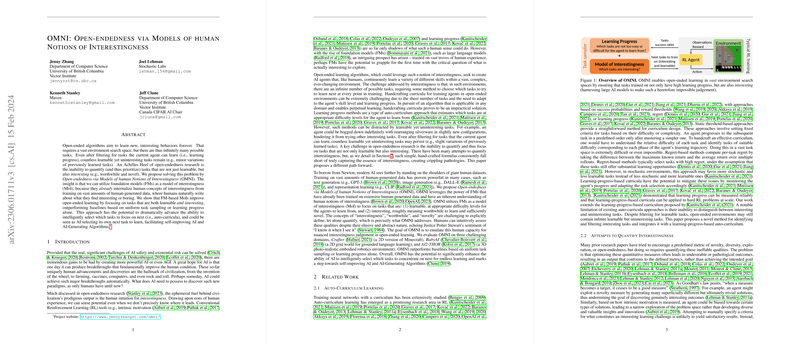Overview of "OMNI: Open-endedness via Models of human Notions of Interestingness"
The paper "OMNI: Open-endedness via Models of human Notions of Interestingness" introduces a novel approach to address a key challenge in the domain of open-ended learning algorithms—specifically, the need to quantify and prioritize tasks based on their learnability and interestingness. The inability to effectively target tasks that are not just learnable but also intrinsically interesting has been a significant hurdle in advancing open-ended learning systems.
Introduction to Open-Endedness via OMNI
Open-ended algorithms aim to continuously explore and learn novel behaviors. This requires navigating vast task spaces, which inherently contain an infinite number of possible tasks, posing a challenge known as the "Achilles Heel" of open-endedness. While previous approaches have focused on learning progress, they often succumb to exploring trivial or repetitive tasks, leading to inefficiencies.
The approach proposed in this paper, termed "Open-endedness via Models of human Notions of Interestingness" (OMNI), leverages foundation models (FMs) trained on large datasets of human-generated content. These models inherently understand human concepts of interestingness by virtue of their training. The authors advocate using these models to guide the selection of tasks based on learnability and interestingness, potentially advancing the self-improvement capabilities of AI through auto-curricula.
Methodology and Implementation
The OMNI methodology involves two primary elements: the Learning Progress (LP) curriculum and the Model of Interestingness (MoI) devised using foundation models.
- Learning Progress Curriculum: This curriculum biases task selection towards tasks at the frontier of the agent’s capabilities by measuring bidirectional learning progress. This involves normalizing current task success rates and tracking changes over time, thereby focusing on tasks that exhibit the most meaningful progress for the agent’s learning trajectory.
- Model of Interestingness (MoI): The core innovation lies in using foundation models to predict which tasks are interesting—defined as novel and worthwhile in human terms. By consulting these models, OMNI focuses on tasks with high learning progress that are also interesting, effectively filtering out uninteresting, redundant challenges.
Experiments and Results
Experiments were conducted across various environments, including Crafter and BabyAI, demonstrating OMNI's capability to outperform baseline methods both in terms of average task success rates and the number of tasks learned. Interestingly, OMNI closely aligns its task performance to an oracle that perfectly discerns task interestingness, validating the approach's effectiveness.
Further, the paper extends these experiments to infinite task spaces, exemplified by the AI2-THOR domain, where it shows that OMNI not only generates learnable and interesting tasks but also facilitates the definition of reward functions through FM-generated code, marking a novel step in open-ended environments.
Implications and Future Prospects
The implications of OMNI are significant both practically and theoretically. Practically, this method provides a new pathway for developing AI systems capable of identifying and pursuing meaningful tasks without human intervention, potentially steering AI towards self-improving mechanisms. Theoretically, OMNI offers an innovative perspective on modeling human-like curiosity and novel task exploration within AI, which may lead to broader applications beyond current open-ended setups.
The paper suggests future directions, such as incorporating multi-modal models for richer task representations and exploring human feedback systems akin to Reinforcement Learning with Human Feedback (RLHF) to further refine the Model of Interestingness. Such developments could be pivotal in addressing the safety challenges inherent to open-ended systems by aligning them closer to human values and ensuring beneficial AI trajectories.
Conclusion
Overall, this paper makes a significant contribution to the field of open-ended learning by leveraging foundation models to emulate human notions of interestingness in task selection. By addressing the challenges of infinite task spaces and intelligently prioritizing tasks, OMNI stands as a promising framework that enhances the capacity of AI systems to engage in perpetual, intriguing, and relevant learning. This represents a step towards not only more effective AI-generating algorithms but also towards AI systems that can autonomously drive meaningful innovation and discovery.
